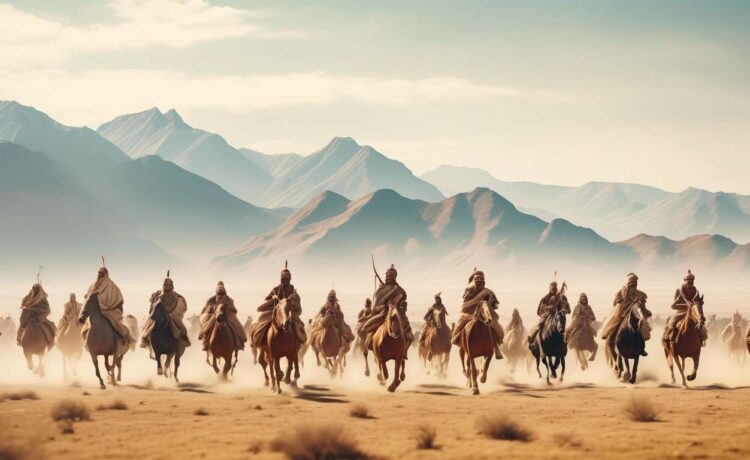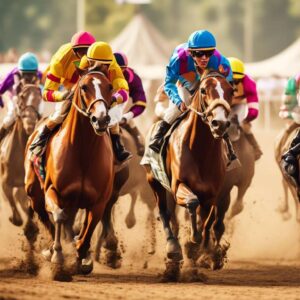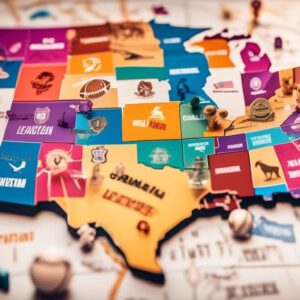Horse racing, a sport that has captivated audiences for centuries, boasts a rich and varied history that is both fascinating and complex. As we delve into the origins of this thrilling pastime, we uncover a tapestry woven from diverse cultures and epochs.
Our journey begins in the ancient civilizations where the earliest forms of horse racing emerged.
- In Ancient Greece and Rome, chariot races were a significant part of their culture.
- The nomadic tribes of Central Asia celebrated speed and endurance, laying the groundwork for the sport’s evolution.
These roots have greatly influenced the modern spectacle we enjoy today.
As horse racing spread across continents, it evolved by adapting to the social and economic landscapes of each era.
Through this exploration, we gain insight into how this sport has not only survived but thrived, becoming a symbol of tradition and excitement.
Together, we embark on this historical journey to discover where horse racing truly began.
Ancient Greece and Rome
Horse racing traces its roots back to the chariot races of ancient Greece and Rome, where it was a popular spectacle that captivated audiences. In those times, we can imagine the roar of the crowd as chariots thundered around the track, each driver pushing their horses to the limit.
This shared experience brought communities together, creating a sense of unity and excitement that we still seek today.
The influence of these early races spread beyond the Mediterranean. In the Arabian Peninsula, swift horses became prized possessions, laying the groundwork for what would evolve into some of the finest racing breeds.
These horses would later play a crucial role in shaping the British racing traditions that many of us hold dear.
As we witness races today, we’re partaking in a tradition that spans continents and centuries, connecting us to a global community of enthusiasts. Together, we celebrate the shared history and thrill of horse racing, rooted deep in time and culture.
Nomadic Tribes of Central Asia
In Central Asia, nomadic tribes played a pivotal role in the evolution of horse racing by breeding resilient horses perfectly suited for harsh terrains. These tribes fostered an enduring connection between humans and horses, setting the stage for the sport’s global journey.
Their expertise in horse breeding not only influenced Ancient Greece but also laid the groundwork for the equestrian skills observed in the Arabian Peninsula.
The contributions of these tribes are evident in several areas:
- Endurance and speed characteristics admired today
- Traditions resonating with British Racing Traditions, emphasizing speed and agility
This shared history connects us with people across time and continents who cherished the partnership between humans and horses. It is a partnership that continues to unite us today.
Early European Horse Racing
Horse racing in Europe began to take shape as societies recognized the excitement and prestige it brought, leading to the establishment of organized events and rules.
In Ancient Greece, chariot races were a key part of the Olympic Games, uniting people in admiration for speed and skill. These events laid the groundwork for what would become a beloved tradition across the continent.
As time progressed, the Arabian Peninsula played a crucial role in shaping racing practices. The introduction of Arabian horses significantly enhanced the quality of racing horses in Europe, sparking a new era of competition.
British racing traditions, deeply rooted in shared history, further solidified horse racing’s place in culture. These traditions encouraged:
- The development of formal rules.
- The construction of iconic racecourses.
Together, these elements fostered a sense of community and belonging, as people gathered to witness the thrill of the race.
Arabian Peninsula Influence
The Arabian horse, renowned for its speed and endurance, revolutionized European horse racing by setting new standards for excellence. This majestic breed, hailing from the Arabian Peninsula, captivated the hearts and minds of horse enthusiasts across continents.
Legacy and Influence
As we embrace the legacy of these magnificent creatures, we find ourselves drawn to a shared history steeped in tradition and innovation.
Historical Impact
In the time of Ancient Greece, horse racing was already celebrated. Yet, the introduction of the Arabian breed brought a transformative influence. Their unique attributes—unmatched stamina and grace—made them sought after, sparking a newfound passion that united diverse cultures.
- These horses became a symbol of prestige and prowess.
- They bridged the gap between ancient traditions and emerging practices.
Evolution of Horse Racing
Together, we trace the lineage of these noble steeds and recognize their undeniable impact on the evolution of horse racing. As we honor the Arabian influence, we celebrate the unity it fostered, laying the groundwork for what would later become British Racing Traditions.
British Racing Traditions
We delve into the storied history of British horse racing, where traditions have been shaped by centuries of competition and cultural exchange.
Our journey takes us back to the influences of Ancient Greece, where the thrill of racing was celebrated in the Olympic Games. These ancient spectacles laid a foundation for what would become a beloved pastime in Britain.
The Arabian Peninsula’s influence was undeniable, as it brought the Arabian horse’s grace and endurance into the mix, thus redefining our racing lineage.
In Britain, horse racing became more than a sport; it evolved into a cherished cultural tradition. The creation of iconic races, like The Derby, fostered a sense of unity and excitement among us, bringing people together from all walks of life.
British Racing Traditions aren’t just about the races but also about the shared experiences and communal gatherings that have grown around them.
Together, we’ve built a rich tapestry of history that continues to thrive today.
American Racing Heritage
In the United States, we’ve cultivated a rich racing heritage that blends diverse influences and innovations, creating a unique and vibrant equestrian culture.
Drawing inspiration from:
- Ancient Greece, where chariot races captivated audiences
- The Arabian Peninsula, with its legendary Arabian horses known for their speed and endurance
We’ve crafted our own racing identity. Our American racing scene is a tapestry woven with threads from the esteemed British Racing Traditions, yet it has developed its distinctive flair.
As we gather at the tracks, there’s a sense of unity and excitement that echoes the historic roots of this sport. It’s more than just a race; it’s a celebration of tradition and community. We share:
- The thrill of the finish line
- The pounding of hooves
- The stories of legendary horses and jockeys that have become part of our shared heritage
Together, we honor the legacy of those who’ve shaped American racing, while forging new paths for future generations.
Colonial America Racing
In Colonial America, horse racing emerged as a popular pastime, setting the stage for the sport’s evolution in the New World. Our fascination with the speed and grace of horses mirrored the traditions of Ancient Greece and the Arabian Peninsula, regions where horse racing had thrived for centuries.
These early influences, combined with the British racing traditions brought by settlers, helped shape a unique racing culture that resonated with our communities.
We established racetracks and held events that became social gatherings, drawing people together in shared excitement and camaraderie. Racing was more than just a sport; it was a way to connect and to belong to something larger than ourselves.
We took pride in our horses, carefully breeding them for speed and endurance, similar to our ancestors in Ancient Greece and on the Arabian Peninsula. The traditions carried from our British forebears ensured that horse racing became an integral part of our colonial identity, weaving a rich tapestry of history and culture.
Evolution into Modern Racing
Over the years, horse racing has transformed from a colonial pastime into a sophisticated global sport. This evolution is a testament to our shared passion that stretches across cultures and continents.
Ancient Greece laid the foundation with its chariot and mounted horse races, igniting a flame of competitive spirit that still burns bright today.
On the Arabian Peninsula, the development of the swift Arabian horse brought about unparalleled elegance and speed, essential elements in modern racing.
As we embraced these influences, British Racing Traditions took center stage by crafting a structured approach that established rules and formalized events. It’s here, in the heart of Britain, where our community found cohesion and a shared sense of belonging, as we gathered to celebrate the beauty and prowess of our horses.
Together, we’ve built a rich tapestry of traditions, blending innovation with heritage. Each race is a nod to the past while galloping toward the future, uniting us in a timeless pursuit.
Conclusion
Horse Racing Origins and Evolution
Horse racing has a rich and diverse history, originating from various ancient civilizations:
-
Greece and Rome: These ancient cultures were among the first to engage in horse racing as a form of entertainment and competition.
-
Nomadic Tribes of Central Asia: These tribes contributed to the development and spread of horse racing through their own traditions and practices.
-
British Racing Traditions: The British racing culture significantly influenced the American horse racing heritage, shaping the sport’s development in the new world.
Evolution into Modern Racing
Through centuries of evolution, horse racing has transformed into the thrilling and competitive sport we know today. It’s fascinating to see how this ancient pastime has evolved into the modern racing events we enjoy.





